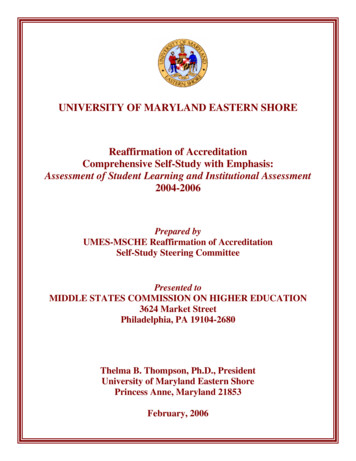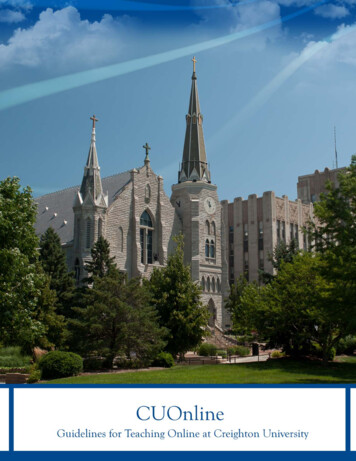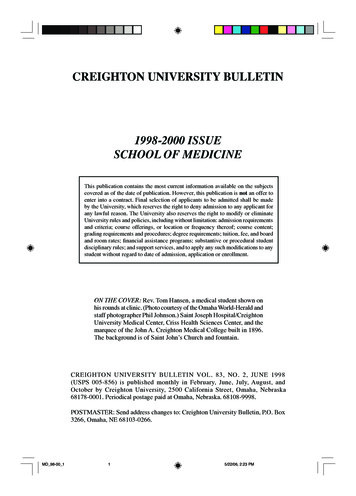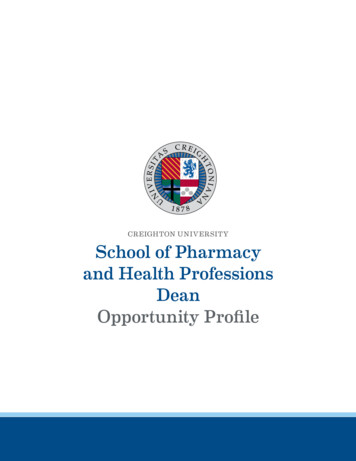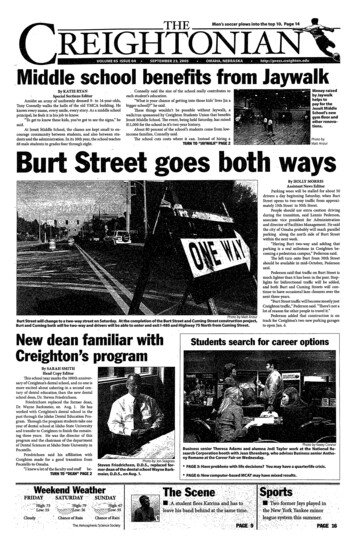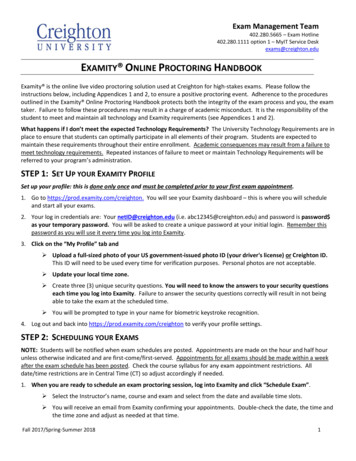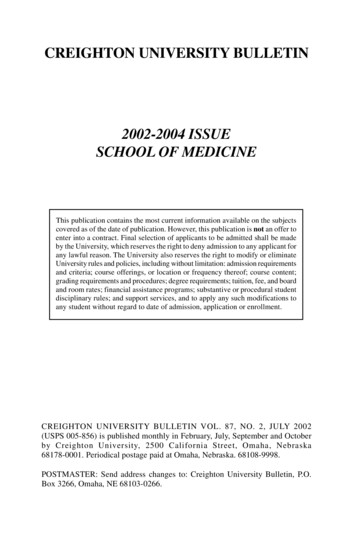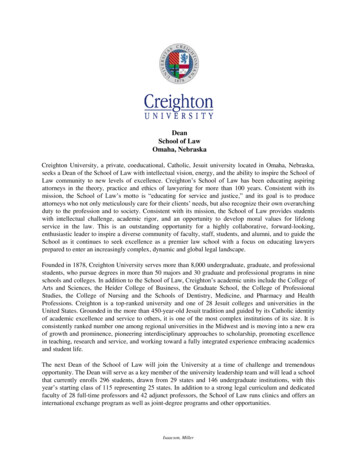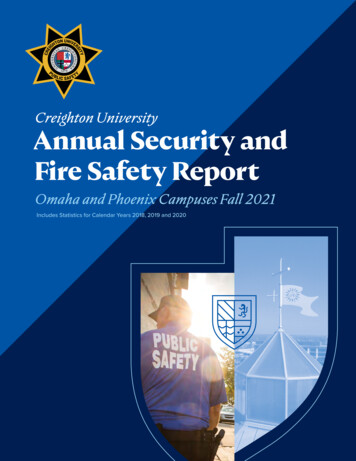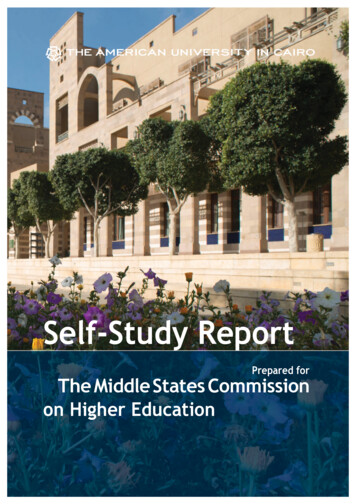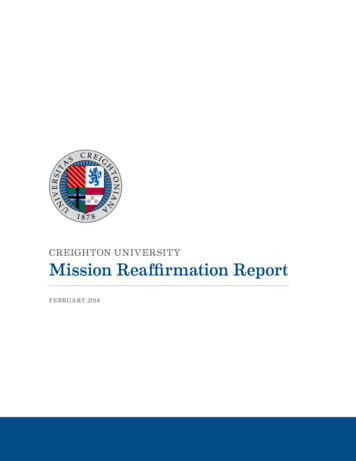
Transcription
C REIGTOI V ER SITHNNNIA1878AASUCREIGHTON UNIVERSITYMission Reaffirmation ReportFEBRUARY 2018
Presidential Review Committee on MissionEileen Burke-Sullivan, STD, Vice Provost for Mission and Ministry, ChairMary Lee Brock, Assistant Professor and Assistant Director, Negotiation and Dispute ResolutionTim Brooks, Vice Provost for Information TechnologyTodd Darnold, PhD, Harper Chair in Business Leadership, Heider College of BusinessJohn Darwin, Special Assistant to the President, President’s OfficeAdrian Dowell, Assistant Athletic Director for Development, Athletics and University RelationsMike Kavan, PhD, Associate Dean, School of MedicineBridget Keegan, PhD, Dean, College of Arts and SciencesKelly Tadeo Orbik, Associate Director, Schlegel Center for Service and JusticeRené Padilla, PhD, Vice Provost for Global EngagementTom Simonds, SJ, Associate Professor and Associate Chair, EducationTanya Winegard, PhD, Vice Provost for Student Life2
ContentsPresidential Review Committee on Mission.2I. Introduction. 4II. Mission.6III. Consolations: The Ways Creighton Fully Lives the Jesuit Mission ofHigher Education in the United States.7Primary Consolations Noted by Our Committee . 7A. Breadth of Awareness of Mission Among Our Faculty and Staff. 7B. Breadth of Faculty and Staff Mission Formation Programs. 8C. The Jesuit Character of Our Integrated Humanities as a Clear Driver of Our Students’Transformative Experiences.9D. Commitment to Global Engagement. 10E. Creighton Jesuit Community’s Collaboration with Colleagues on Catholic and JesuitMission Formation. 11F. Service to the Local Catholic Church and the Omaha Community. 12G. Centers and Institutes that Promote Catholic and Jesuit Identity.13H. The Creighton Community Gathered in Prayer. 14I. Reminders of Catholic and Jesuit identity. 16IV. Desolations: The Ways Creighton Strives to More Fully Live the JesuitMission of Higher Education in the United States. 17Primary Desolations Noted by Our Committee .17A. Faculty, Staff, and Student Diversity and Inclusion.17B. Faculty and Staff Formation in the Spiritual Exercises. 18C. Affordability of a Creighton Education. 19D. Effective and Transparent Communication and Decision-Making. 19E. Challenges to Catholic, Jesuit Mission from Geographical Expansion.20V. Forming Our Lay Partners: An Extended Reflection. 21VI. Hiring for Mission: An Extended Reflection. 22VII. Conclusion.23Appendices.243
8,393student named2017 GoldwaterScholar2016 enrollmentstudent named2017 Fulbrightaward winner2nd-largest in University’s history.Undergrad: 4,204 Graduate/Professional: 4,189undergrads200presentationsby undergradsTree Campus USAdesignation for 9 consecutive yearsfrom the Arbor Day Foundation22universityin the Midwest for the14th consecutive yearNumerous graduate programsrecognized for excellencefor internship opportunities–U.S. News & World Report50nearlyparticipated inresearch rogramsfunded by theCreighton Global InitiativeSchools and CollegesCollege of Arts and SciencesSchool of MedicineSchool of LawSchool of DentistrySchool of Pharmacy and Health ProfessionsHeider College of BusinessGraduate SchoolCollege of NursingCollege of Professional StudiesI. IntroductionWith nine schools and colleges across an array ofdisciplines and professions, Creighton is one of themost complex universities in the country. No otheruniversity its size offers such rigorous, multidisciplinaryacademics coupled with personal attention fromfaculty-mentors in a faith-based environment. As such,Creighton is uniquely positioned to serve our Jesuit,Catholic mission through a transformative educationin service of a diverse, global society.Nowhere is Creighton’s commitment to its Jesuitcharacter more apparent than in the studentsit develops holistically, teaches, learns with, andgraduates. The Creighton experience integratesintellectual, personal, spiritual, and career developmentthrough the rigorous study of the humanities andliberal arts along with discipline-specific content sothat graduates perform well in their fields—and maketheir mark upon the world. Whether they becomeeducators, scientists, healthcare providers, socialworkers, entrepreneurs, or experts across a broadrange of fields, Creighton graduates can draw fromthe liberal arts to imagine new avenues of inquiry,communicate effectively as leaders, and reflect deeplyand critically upon the best ways to care for people whoare vulnerable and on the margins of society. Creightongraduates strive to keep ethics, understanding, andempathy at the forefront of all they do, and they goforth from our classrooms, studios, laboratories,clinics, and experiential learning sites to set the worldon fire.Creighton students are known as empathetic,intelligent, discerning, and influential practitioners andcitizens who are equipped to engage the gritty realitiesof the world we inhabit. Striving always to make theirmark upon the world, our students are ambitious,frequently of high-quality, increasingly diverse, andhighly service-oriented, thanks in large part to theexperiences they are afforded while at CreightonUniversity. Our faculty, staff, and administrators worktirelessly to ensure that Creighton students have accessto a well-rounded Jesuit, Catholic education.Our Mission Reaffirmation process confirmsCreighton University’s commitment to maintainingand strengthening our Jesuit and Catholic mission.The summary of this process in the pages that followis both more and less than a simple catalogue of theprograms, projects, initiatives, and other deeds through4
I. Introduction (continued)which we live our Catholic, Jesuit mission. It is morein that it reflects thoughtful consideration of the areaswhere Creighton is strong and where our communitydesires more. And it is less in that it does not describethe entirety of what we do for mission, instead focusingon those matters that emerged most clearly in thisMission Reaffirmation process.To organize the work of the Mission Reaffirmationprocess, Rev. Daniel Hendrickson, SJ, President,appointed a Presidential Review Committee onMission. To engage in the Mission Reaffirmationprocess, our Presidential Committee reflected uponmaterials developed by the University Office of Missionand Ministry and the ministry offices and committeesin the colleges, schools, and operational departmentsof Creighton University. Some of the materials ourCommittee reviewed included: documentation fromthe 2016 Creighton University Area Examen process,documentation from our 2017 Higher LearningCommission accreditation self-study and site visit,data from a 2016 Gallup survey of our students, theUniversity Mission Statement, and the 2016 XavierUniversity mission survey. Pairs of Committeemembers were assigned to reflect on each documentand were asked to discern the consolations anddesolations related to Creighton’s mission throughreflective reading and prayer over these documents.In spring 2016, our University community engagedin a campus-wide Area Examen process modeledon the Jesuit daily Examen. Fr. Hendrickson askedeach department and unit to gather and reflect onits distinctive contribution to Creighton’s Jesuit andcommunal character, educational mission, andinstitutional priorities along with our dreams for thefuture. (The instructions for the Area Examen processare in Appendix A.) Each area of the University thenprovided a written summary of the hopes, desires,questions, and concerns that arose during its AreaExamen deliberations.Later in spring 2016, each department and unitdesignated representatives to participate in communaldiscernment on the Area Examen materials forwardedfrom all segments of the University. Dr. Burke-Sullivan,Vice Provost for Mission & Ministry, then convenedan Area Examen Review Committee of faculty withqualitative research expertise to review the AreaExamen and communal discernment materials, and toidentify themes and areas of common focus. Choosingto adopt an Ignatian approach to its work, the AreaExamen Review Committee reported its findingsas consolations and desolations of the Creightoncommunity to the president in the summer. An excerptof the report from the Area Examen Review Committeeis included as Appendix B of this document.In fall 2016, Fr. Hendrickson appointed strategicplanning committees to assist him in discerning aboutprojects, programs, and initiatives that would respondto the consolations and desolations from the 2016 AreaExamen process, advance Creighton’s mission, andmeet our challenges and opportunities. The ensuingstrategic planning process continued to seek andincorporate the campus community’s feedback whiledeveloping concrete plans and proposals to move theUniversity toward a bolder future. The result was thenew Lighting the Way strategic plan that was approvedby the University Board of Trustees in November 2017.Our Presidential Review Committee on Mission,rather than collecting new information, reflected onthe wealth of information that had already beencreated and gathered during the strategic planningprocess, including the 2016 Area Examen ReviewCommittee report.5
II. MissionDuring the process of reflecting on the Mission Statement of Creighton University, our Reaffirmation ofMission Committee was consoled to see how our Catholic and Jesuit character are woven into the fabricof our University Mission Statement.Creighton University Mission StatementCreighton is a Catholic and Jesuit comprehensive university committed to excellence in itsselected undergraduate, graduate and professional programs.As Catholic, Creighton is dedicated to the pursuit of truth in all its forms and is guided bythe living tradition of the Catholic Church.As Jesuit, Creighton participates in the tradition of the Society of Jesus, which provides anintegrating vision of the world that arises out of a knowledge and love of Jesus Christ.As comprehensive, Creighton’s education embraces several colleges and professional schoolsand is directed to the intellectual, social, spiritual, physical and recreational aspects of students’lives and to the promotion of justice.Creighton exists for students and learning. Members of the Creighton community are challengedto reflect on transcendent values, including their relationship with God, in an atmosphere of freedomof inquiry, belief and religious worship. Service to others, the importance of family life, the inalienableworth of each individual and appreciation of ethnic and cultural diversity are core values of Creighton.Creighton faculty members conduct research to enhance teaching, to contribute to the bettermentof society, and to discover new knowledge. Faculty and staff stimulate critical and creative thinkingand provide ethical perspectives for dealing with an increasingly complex world.The Creighton University Mission Statement clearly communicates that Creighton is a comprehensive Catholicuniversity that participates in the intellectual apostolate of the Society of Jesus. The Creighton communitydiscerns its identity and mission through evolving processes and gatherings that give space for reflection andsharing on who we are and who we are called to be. Members of the Creighton community collaborate with eachother in teaching, research, and service, and engage local, national, and global partners to transform the world.Creighton faculty, staff, and administrators network with the Catholic Church, the Society of Jesus, and otherJesuit colleges and universities in pursuit of our common charge to participate in God’s reconciling mission in theworld. The pages that follow show how Creighton University has embraced the Society of Jesus’ way of proceedingthrough discernment, collaboration, and networking in our way of epitomizing a Catholic, Jesuit university.6
III. Consolations: The Ways Creighton Fully Lives theJesuit Mission of Higher Education in the United StatesCreighton University is often recognized by its peerinstitutions and agencies as deeply committed toits Jesuit values and mission. Creighton’s students,faculty, staff, and administrators recognize the valueand importance of the University’s Jesuit character. Inthe Area Examen conducted in 2016, participants fromall nine of Creighton’s schools and colleges—nearly75% of employees in every area of the Universityparticipated—reported a strong ethos of cura personalisacross the University, identified a broadly sharedpassion for and commitment to Ignatian charismsand values, and recognized a shared belief that Jesuiteducation transforms lives. Too, the 2017 XavierUniversity Mission study (Appendix C), received justbefore this report was written, affirmed, among otherthings, that most Creighton employees understandour mission and Jesuit principles. (The report wasnot received in time to more fully integrate it intothis document.) Indeed, the breadth of awareness ofCreighton’s mission among our faculty and staff is acentral consolation of our current Committee’s MissionReaffirmation Report.In the words of Fr. Peter-Hans Kolvenbach, SJ, formerSuperior General of the Society of Jesus, “the realmeasure of our Jesuit universities lies in who ourstudents become.” On this measure, Creighton doesvery well. Our graduates are known as empathetic,intelligent, discerning, and influential practitioners andcitizens who are equipped to engage the gritty realitiesof the world we inhabit. Striving always to make theirmark upon the world, our students are ambitious,frequently of high-quality, increasingly diverse, andhighly service-oriented, thanks in large part to theexperiences they are afforded while at CreightonUniversity. Our faculty, staff, and administrators worktirelessly to ensure that Creighton students have accessto a well-rounded Jesuit, Catholic education.Recognizing, however, that our efforts to remaincommitted to our Jesuit identity must be constant,Creighton has recently taken several tangible stepsto re-affirm and strengthen our mission. In 2012, theCreighton University Jesuit Community collaboratedwith the Wisconsin Province of the Society of Jesusto clarify their relationship to each other and theUniversity, and to identify ways in which the Universitycould preserve and promote its Catholic and Jesuitcharacter. A Declaration of Mutual Purpose was signedby our President, the Chair of the Board of Trustees,and representatives of the Wisconsin Province.Additionally, since the position’s creation in 2014,Creighton’s Vice Provost for Mission and Ministry hasbeen working with University leadership on a missionformation program for new employees. And, mostrecently, Creighton’s president has worked with theUniversity community on a new strategic plan, with keyelements to include reaffirming our commitment tothe liberal arts, highlighting the historical foundationsof Jesuit education, and launching a Catholic SocialTeaching Initiative. We are consoled that Creightonleadership is cognizant that it must continue to takesteps to ensure Creighton remains rooted in itsJesuit identity.Primary Consolations Noted by Our CommitteeA. Breadth of Awareness of Mission Among OurFaculty and StaffAn array of Creighton faculty and staff have a broadknowledge of, and admiration for, the Jesuit missionand experience (United States Characteristics of JesuitUniversities, 3 & 4). For example, Creighton’s 2016 AreaExamen (the Area Examen Review Committee reportis attached as Appendix B) found that faculty and stafffrom all areas of the University shared a passion forIgnatian charisms and values. Creighton employeesbelieve that Jesuit education changes lives.Our self-identified commitment to mission holds up toexternal scrutiny, as well. In early fall 2017, our nationalaccreditation site visit team noted that: Creighton’s mission is broadly understoodwithin the institution and guides its operations Creighton’s mission is articulated publicly,identified clearly, and explained fully Creighton understands the relationshipbetween its mission and the diversity of society Creighton’s mission demonstrates commitmentto the public goodWe are fortunate to have faculty and staff who aredrawn to and cognizant of the Jesuit tradition. Ourcurrent institutional awareness of mission helps attractfaculty and staff who have the skills and desire tofurther our excellence. With this strong foundation anda growing number of mission formation opportunities,Creighton is well-poised to strengthen its Jesuitidentity and mission heading into the future.7
III. Consolations: The Ways Creighton Fully Lives theJesuit Mission of Higher Education in the United States (continued)B. Breadth of Faculty and Staff MissionFormation ProgramsCreighton is committed to mission formation of allnew members of our community, as well as ongoingdevelopment of those who are already part of ourcommunity (United States Characteristics of JesuitUniversities, 3 & 4). Through an emphasis on formation,we invite lay staff, faculty, administrators, students,and trustees into a deeper understanding of Ignatianspirituality and participation in Creighton’s Jesuit,Catholic mission. Creighton will also seek to encouragefaculty and staff to participate in more mission-centricleadership opportunities moving forward. Our layformation initiatives take on added significancein light of the declining number of Jesuits oncollege campuses.Our broad commitment to formation for missionis demonstrated through the following programs: Creighton administrators regularly participatein the national Ignatian Colleagues Program ofthe Association of Jesuit Colleges and Universities(AJCU). To date, 14 faculty and two staff membershave participated in the program. Approximately 20 faculty, staff, and administratorsalso have participated in the AJCU’s JesuitLeadership Seminar for current andemerging leaders. Creighton holds the annual Ignatian Seminar forfaculty and staff that offers a closer examination ofSt. Ignatius and the Jesuit tradition. The Seminartopics include the social justice, Ignatian Pedagogy,and the Catholic Church. The seminar meets10 times over the academic year, including anovernight silent retreat and a required academicproject. More than 200 faculty members andadministrators have participated in the seminar. Creighton Colleagues Program (CCP) providesIgnatian formation for faculty and staff leaders.The CCP meets six times in a large group and thenin smaller group meetings. Participants—64 todate —are invited to take part in the program by theOffices of the Senior Vice President for Operationsand the Provost based on nominations from school,college, and division leaders. The Graduate Certificate in the Ignatian Tradition isan advanced formation opportunity for faculty andstaff interested in deepening their engagementwith Ignatian spirituality. The Certificate program isa three-course sequence that includes an IgnatianPilgrimage to historically important places innorthern Spain, Paris, and Rome. The Certificateis offered to Creighton faculty and staff as anadvanced form of Ignatian formation with a subsidyfor travel costs related to the Ignatian Pilgrimage.In addition to these programs, the University hasinaugurated a new NOVICE Formation Program;NOVICE stands for Newcomer Orientation ValuingIgnatian and Creighton Engagement. This programgrew out of the participation of two Creightonadministrators in the Ignatian Colleagues Program.During the 2016-17 academic year, Creighton Universityinitiated a pilot program to provide Ignatian formationand exposure to the history and culture of CreightonUniversity and the City of Omaha. The pilot programwas offered to existing Creighton faculty and staff toreceive feedback before implementing the programfor all new faculty and staff in fall 2017. The programextends over two semesters of the regular academicyear and integrates faculty and staff into commonlearning experiences and specialized learning. Thisprogram does not replace other forms of orientationfor new faculty and staff that are unique to particulardivisions, colleges, or schools, but does provide afirm foundation in information, formation, and skillsappropriate to a Creighton employee from every areaof the campus. First-year enrollment in the NOVICEFormation Program is approximately 90 employees.In addition to the faculty and staff formation programsprovided at the University level, our schools, colleges,and divisions provide mission formation programs andopportunities. For example: The School of Nursing holds a new faculty andstaff orientation focused on University mission,including online modules on mission andJesuit values. The School of Pharmacy and Health Professionsoffers noon seminars, book discussion groups, andother formation programs on Jesuit mission andidentity, Ignatian values, and social justice. To meet the needs of Creighton faculty and staffworking away from our main campus, an additionalcohort of the Ignatian Seminar is now offered at theCreighton University Medical Center–Bergan Mercycampus, which is located approximately 20 minutesaway from our main campus. Each school, college, and residence hall isassigned a chaplain to work with the administrationand faculty on mission-related projects andprograms. (Our Phoenix regional campus also hasits own Jesuit chaplain.)8
III. Consolations: The Ways Creighton Fully Lives theJesuit Mission of Higher Education in the United States (continued) Student Life has a yearlong formation seminarfor new professionals focusing on student affairswork as it is informed by the Ignatian traditionand teaching pedagogy. The Ignatian LearningImperative is used to guide the monthly seminars.One growing challenge in mission formation is tofurther integrate Creighton’s Jesuit, Catholic missioninto our expanding work with health care partners offour main campus in Omaha and in Phoenix, Arizona.Our new university strategic plan recognizes thischallenge as a priority and commits resources to themission formation and development of our communitymembers working away from our main campus.Inherent in the mission and embedded withinCreighton’s core Jesuit values is its promise to integrateeducation, service, and faith for the betterment ofsociety. To this end, Creighton invites and supportsall members of the community to engage incommunity-based service and service-learningactivities. The Schlegel Center for Service and Justiceand the Division of Mission and Ministry coordinateexperiences that emphasize accompaniment, service,learning, and reflection for and with marginalized,vulnerable populations. The Office for AcademicExcellence and Assessment publishes a monthlye-newsletter, “Update on Service-Learning,” toshare the breadth and potential of service-learningopportunities. And the newly-created Office ofAcademic Service-Learning provides workshops,professional development, and other resources forCreighton faculty interested in fostering positive socialchange through academic service-learning coursesand community-based research projects.C. The Jesuit Character of Our IntegratedHumanities as a Clear Driver of Our Students’Transformative ExperiencesCreighton embraces our identity as Catholic and Jesuit,and recognizes the critical importance of the liberalarts and humanities to our Jesuit mission (United StatesCharacteristics of Jesuit Universities, 2). All Creightonstudents—not just those studying humanities—receivea well-rounded education that teaches them to bechange agents and doers of justice. Our integratedhumanities model not only provides discipline-specificeducation and training, but also equips each learner toanswer complex questions and confront gritty realities.Both in and out of the classroom, Creighton studentsare formed, informed, and transformed by a myriadof educational and experiential opportunities. OurUniversity’s dedication to the Jesuit traditions of liberalarts and Christian humanistic education is reflected inthe following examples: The Magis Core Curriculum, designed by ourfaculty, serves as the cornerstone of a Creightoneducation and lays a shared foundation forstudents as responsible citizens of the globalcommunity (Magis Core Curriculum Summary,Appendix D). Our undergraduate core curriculummixes courses in writing and speaking, emphasizesthe importance of critical thinking, and engagesstudents in dialogue about life’s biggest questions. A new service learning program is being developedin the undergraduate colleges to supplementthe more extensive existing and planned servicelearning programs in Creighton’s health sciencesschools (including Physical Therapy, OccupationalTherapy, Pharmacy, Dentistry, and, followingthe introduction of a revised curriculum in2019, Medicine). The Cortina Community is an intentionalsophomore living-learning community thatprovides students the opportunity to live oncampus, united around a core focus on justice,service, and faith; the Cortina community at largeengages students in weekly community formationand service, coupled with retreats, immersions,and speakers. The Schlegel Center for Service and Justiceengages students in community service, reflection,and Ignatian Advocacy in order “to awaken heartsand lives of solidarity to build a more just world.” Creighton Campus Ministry, working closely withSt. John’s Parish on the University’s campus,provides opportunities for Creighton students togo on retreats, engage in community worship, andgrow in their faith. The office of the Vice Provost of Mission andMinistry, led by Eileen Burke-Sullivan, STD,provides students with opportunities to integratefaith, education, service, and justice throughCreighton’s Jesuit, Catholic tradition. Dr. BurkeSullivan’s vice provost position was created in 2014in an effort to animate Creighton’s mission, bothinstitutionally and individually, in the intellectualand faith life of the community. While mission andministry are present throughout the University inmany other ways, the office of the Vice Provostprovides significant leadership in thesecritical areas.9
III. Consolations: The Ways Creighton Fully Lives theJesuit Mission of Higher Education in the United States (continued) In Creighton’s new strategic plan, approved by theBoard of Trustees in November 2017, the Universitymade public its goal of “Leading with the LiberalArts,” which devotes significant resources andefforts toward making Creighton a worldwideleader in the integration of liberal arts educationinto all its curricula, including graduate andprofessional schools.Starting with a core that was intentionally selectedto provide a congruous liberal arts educationalexperience for all undergraduate students, andcontinuing outward into a campus community thatenables students to engage with important elements ofa Jesuit education—from service learning to worship toreflection—Creighton excels at transforming studentsand positioning them to make a positive impact on theworld. In a recent Gallup survey (Appendix E), 74% ofundergraduate students, 76% of graduate students,and 85% of professional students agreed or stronglyagreed that Creighton’s faculty and staff helped themdevelop greater empathy and compassion.D. Commitment to Global EngagementCreighton recognizes that our Catholic, Jesuit missionrequires that we cultivate a global consciousness andpraxis among our faculty and students (United StatesCharacteristics of Jesuit Universities, 4). Through thework of the Creighton Global Initiative and other globalengagement, our faculty and students bring the livesof those at the margins into their lived experiences.Campus courses, immersion abroad, and otherengagement develops an understanding of our globalneighbors, and brings them to our community.The Global Engagement Office (GEO), led byDr. René Padilla, Vice Provost for Global Engagement,facilitates campus-wide advocacy and supports theimplementation of Creighton’s goals for internationaleducation and exchange as members of an increasinglycomplex global society. The GEO’s Mission Statementdemonstrates its comprehensive charge:The GEO will expand Creighton’s capacity to servein solidarity with neighbors and nations to bringexpertise, innovation, compassion, and leadershipas committed partners in meeting the complexchallenges of the present and in realizing thepossibilities for the future on a local, national
Faculty and staff stimulate critical and creative thinking and provide ethical perspectives for dealing with an increasingly complex world. The Creighton University Mission Statement clearly communicates that Creighton is a comprehensive Catholic university that participates in the intellectual apostolate of the Society of Jesus.

